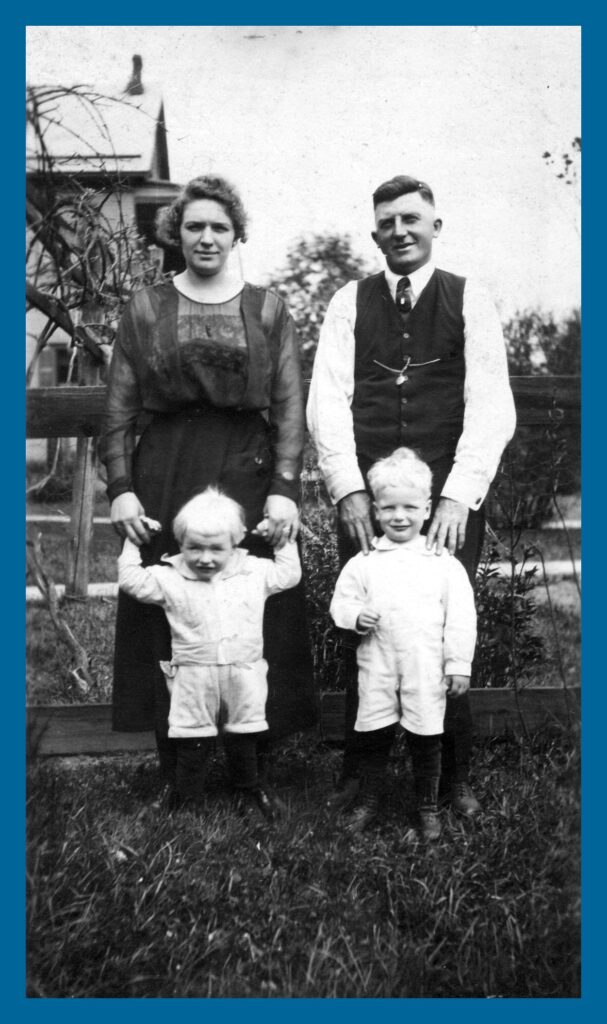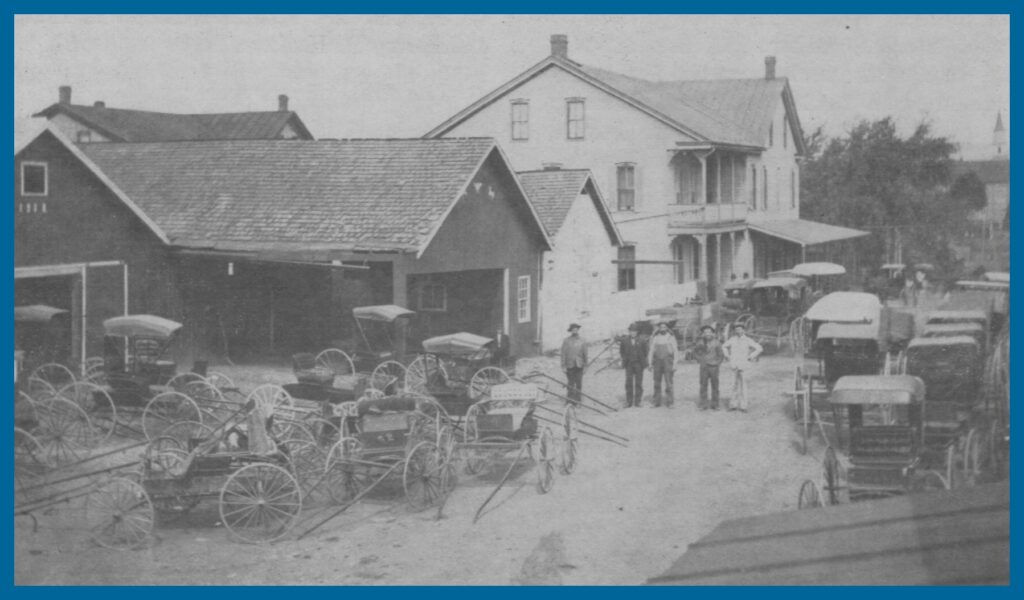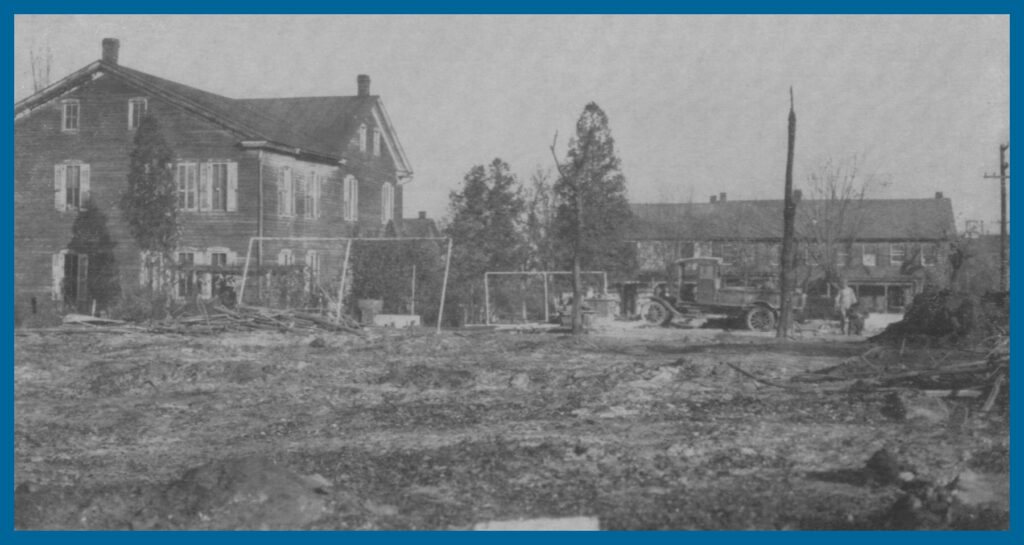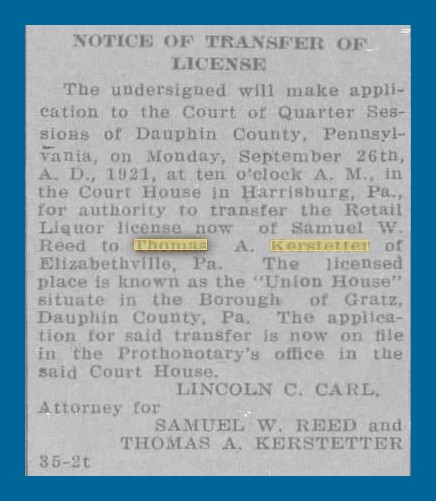A snapshot photograph of the Thomas Kerstetter family, who in 1924 were living at the Union House Hotel on the southwest corner of Market and Center Streets, Gratz, Dauphin County, Pennsylvania. The children are Robert Cleveland “Bobby” Kerstetter (1918-1964) and Thomas Ammon Kerstetter Jr. (1917-1981). In the rear are parents Mary Susanna “Mae” [Henderson] Kerstetter (1896-1966) and Thomas Ammon Kerstetter (1882-1944).
The Great Gratz Fire of 1924 began in the early morning hours of November 3, 1924, It probably started in the ice house behind the hotel. When it was finally under control, the entire center of Gratz was leveled. The photo above shows the Union House Hotel with its outbuildings including garages and barns as it looked prior to the fire. The photo below shows what was left after the fire.
The Elizabethville Echo reported the following in its November 5, 1924 edition:
Though the origin of the fire is not known there are some who suspect incendiarism. Thomas Kerstetter, who was the tenant proprietor of the hotel, and his family were fast asleep when the flames were discovered licking their way up along the side of the three story building, and they were not easily aroused. With their children, Thomas and Bobbie, 6 and 5, the parents quickly got out of the building and the neighbors helped to remove clothing, furniture and valuables.
On July 29, 1920, the Echo reported that the Kerstetter family moved out of the St. Lawrence Hotel in Berrysburg where Thomas had been the tenant proprietor. On September 15, 1921, the Echo reported that the Union House Hotel in Gratz was sold to George Adams, but the furnishings were sold to Thomas Kerstetter, who, it was said was planning to move into the hotel.
Then on September 23, 1921, the Echo reported the application for a liquor license transfer to Thomas A. Kerstetter for the Union House in Gratz. It must be noted though that the 18th Amendment to the U. S. Constitution went into effect on January 17, 1920, making the country “dry,” so the license that was transferred to Kerstetter had to meet the requirements of the Volstead Act of 1919 which established the legal limits for intoxicating beverages. It is not known whether a “speakeasy” was operating in the Union House, but that might be an interesting subject to pursue.
The bar and dining room at the Union House were popular “hangouts” for the locals during the period of Kerstetter’s proprietorship, 1921-1924. The hotel was also the official polling place for Gratz Borough. In fact, the ballots and election equipment were named as items rescued from the fire, election day being the same day that the blaze occurred. The hotel was also the location of public sales, particularly in the colder weather when such events could not be held outdoors. The numbers of rooms in the hotel was not stated in any of the news reports, but it appeared from how the fire was reported that the Kerstetter family members were the only occupants when the fire occurred. It must be assumed though that there were times that the hotel was full to capacity, such as during the Gratz Fair, which had been held from September 30 through October 3, 1924.
Upon seeing the photo of the Kerstetter family (above) for the first time, there was some speculation that it was taken in Gratz, but the roof line of the house at upper left is not consistent with any building in Gratz that is located near the center square of town. Knowing that Thomas Kerstetter had been in Berrysburg prior to coming to Gratz, the photo was most likely taken there, perhaps somewhere near the St. Lawrence Hotel, which according to a report in the Echo of February 22, 1917, he was operating for W. H. Bowman. The first son of the Kerstetter’s was born in July 1917, so it can be safely said the first home of this family of four was in Berrysburg. The Echo also reported that Kerstetter made sale of the St. Lawrence furnishings in 1920, just before coming to Gratz. The reason that the Kerstetter’s left Berrysburg is not known at this time.
Who were Thomas Kerstetter and Mary Kerstetter?
Thomas Ammon Kerstetter was born on March 17, 1882, in Tylersville, Clinton County, Pennsylvania, the son of Joseph Ambrose Kerstetter (1852-1925) and Rebecca Henrietta [Grenninger] Kerstetter (1852-1912). Thomas married Mary Susanna “Mae” Henderson at Sunbury, Northumberland County, Pennsylvania, the marriage being officiated there by Rev. H. D. Kreider of the 1st Evangelical Church. For the World War I draft, Thomas indicated that he was a landlord and his place of business was Berrysburg, consistent with being the hotel keeper there. Likewise, for the 1920 census, he was still living in Berrysburg, but he indicated that he had no occupation. The census was apparently taken after he had given up the proprietorship of the St. Lawrence Hotel. In 1928, a newspaper report indicated he was residing in Dillsburg, York County, and was visiting friends in Gratz. By 1930, still in Dillsburg, he reported that he was a retail merchant in the automobile industry. And finally, in 1935 and 1940, he was living in Camp Hill, Cumberland County, where he was a salesman working on his own account. Thomas Kerstetter died on June 7, 1944, of arteriosclerotic heart disease, at the Harrisburg Hospital. The death certificate gives his occupation as auto dealer, but no occupation is mentioned in the obituary that appeared in the Harrisburg newspaper. He is buried at the Mt. Olivet Cemetery in New Cumberland, Cumberland County. His funeral was officiated by Rev. E. S. Frey, pastor of the Trinity Lutheran Church.
Mary Susanna “Mae” Henderson was born in Philadelphia on October 11, 1896, the daughter of Susan McDivitt (1867-1898) and John Newton Henderson (1862-1917) who also went by the name John Mix. When the mother died, Mary became a ward of the Catholic Church and was moved from one foster home to another. In research done by Tim Conrad, and publicly posted on Ancestry.com, a baptismal certificate was discovered for Mary from St. Charles Barromeo Catholic Church, Philadelphia, March 25, 1897, which also confirms her birth date. Mary was 20 years old when she married Thomas Kerstetter, and her movements from her last foster home to her maturity at age 18 are not known at this time. How she met Thomas Kerstetter is also a mystery as is how she ended up in Central Pennsylvania. What is known is that after her marriage to Thomas her life became more stable and although she lived in several places while raising her children, the family kept together as a unit. After Thomas died in 1944, she lived as a widow for 22 years. Her son Bobby died in 1964. Her last residence was Camp Hill when she died January 21, 1966 at the Harrisburg Polyclinic Hospital. Of course, there were lingering memories of that terrifying night in Gratz when the whole family almost burned up in the fire at the Union House. Mary is buried with her husband at the Mt. Olivet Cemetery at New Cumberland.
The cause or causes of the Great Gratz Fire of 1924 may never be known. We are thus left with rumor and speculation, and as such, we begin with the Echo report which refers to “some” suspecting “incendiarism.” In that same article from the Echo, the following is stated:
The common opinion seems to be that if the ice house was not set on fire, that a lighted cigaret may have been the cause, since the fire had its origin there.
As late as the early 21st century a few old timers in Gratz believed that the fire resulted from Ku Klux Klan activity and was either set directly as a warning or resulted from a burning cross whose embers had not been completely extinguished. If that’s what happened, then a motive would have to be determined. Was the hotel a target or were the Kerstetter’s a target? It is estimated that around 50% of the residents of Gratz had some connection to the Klan in the mid-1920s, and 1924 was the beginning of the Klan’s domination in the Lykens Valley area. Crosses were typically burned to announce the arrival of the Klan in a community and to intimidate those who did not fit the mold of what the Klan saw as “their people,” which included Blacks and other non-whites, Catholics, and Jews.
If the fire was totally accidental, then the “lighted cigarette” theory may be a good explanation.
Whether accidental or set, the fire got out of control as a result of gale force winds and, because Gratz had neither a water system nor a fire department, took much longer to put out than it should have and covered a wider area of town than the hotel itself. Gratz suffered greatly from the fire, and individuals who were later identified as members of the Klan or were Klan sympathizers suffered a great financial loss. It is doubtful that these individuals would have willingly torched their own property.
_______________________________________________
The photo of the Thomas Kerstetter family was publicly posted in Ancestry.com by Tim Conrad. Photos, before and after, of the fire, were previously published on this blog.
News articles from Newspapers.com.
Corrections and additional information should be added as comments to this post.



